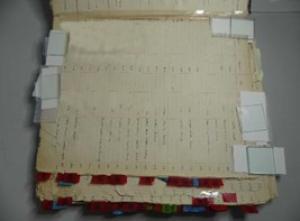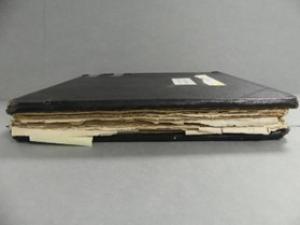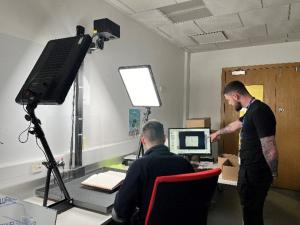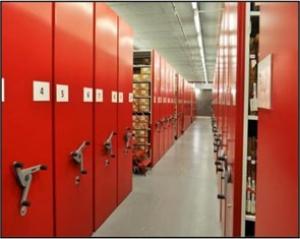Introduction
The Independent Panel is very conscious of the importance of records and archives as part of the truth recovery process and recognises the difficulties that victims-survivors have faced in getting access to relevant information.
The Independent Panel is committed to helping people to get access to records which could hold valuable information about their personal experiences and identity.
Staff in the Public Record Office of Northern Ireland (PRONI) have been helping the Independent Panel with their investigation by gathering, organising and maintaining the relevant records and archives, and putting them into a digital format. To do this, PRONI and the Independent Panel have been working with a number of authorities, institutions, organisations and individuals who have these records.
PRONI was set up in 1923. It protects and gives access to records of government departments and public agencies, as well as records from a range of private sources. Further information on PRONI.
Why Is This Work So Important?
Concerns were raised in 2021 about the condition of some of the records held by institutions/organisations. Victims-survivors have also been concerned that records could be destroyed or damaged because of poor handling. They have urged both the Northern Ireland Executive Office and Members of the Legislative Assembly (‘MLAs’) to take action.
On the 12 May 2022, the Preservation of Documents (Historical Institutions) Act (Northern Ireland) 2022 was passed into law.
The aim of this Act is to make sure that records of the relevant institutions/organisations are safely kept and not destroyed.
Private Records
Many of the records that are relevant to the Independent Panel’s work are private records, i.e. they do not belong to government departments or public agencies. This includes records of religious orders, charitable institutions, adoption agencies and other bodies.
Because they are private records, the owners of the records do not have to transfer them to PRONI or to make them available to the Independent Panel or to members of the public. Permission is needed from the owners of the records to get access to them. PRONI and the Independent Panel have been working with a number of institutions and agencies to get them to volunteer to make their records available to the Independent Panel.
Surveys and Site Visits

At the start of the Independent Panel’s work, PRONI carried out a survey of the records kept by the relevant institutions/organisations. This involved physically inspecting the records, looking at how and where they are stored, and giving advice on how the records should be stored and handled. These visits took place throughout Northern Ireland, the Republic of Ireland, and in London, to find out how well the institutions/organisations were meeting their responsibilities under the Preservation of Documents (Historical Institutions) Act (Northern Ireland) 2022.
In addition to finding out what records exist, the visits also helped PRONI to identify some potential risks. PRONI assessed what would be needed to carry out their work on the records while keeping them safe, and to make them available to the Independent Panel and the future Statutory Public Inquiry. Conversations were held and continue, with the aim of finding other sources of records which may be relevant to the Independent Panel’s work.
Conserving, Cataloguing and Digitising

The process of gathering, organising, maintaining the records found during the survey, and putting them into a digital format, is underway and will continue in stages over the coming months.
Poor quality paper and coverings mean that records will naturally lose their quality over time. This can be made worse through poor storage and careless handling. Loose or torn pages can result in the loss of important information. PRONI staff are undertaking the task of moving the records which may have been stored poorly over many years to new locations (acid-free archival enclosures). They are also removing metal staples or clips which can rust and cause damage to paper documents. Records which have been badly damaged need to be specially repaired in PRONI’s conservation studio. All this maintenance work is carried out before the records can be put into a digital format.

Each file, and every individual page, is numbered to prepare it for being put into a digital format. This makes sure that the pages are kept in the right order during the process, and that no pages are missed.
Records are put into a digital format using special equipment which protects the documents during the process. After the images are made, they are checked for quality, to make sure that the images are clear.
The records are also put into order, which involves detailed work, looking at the contents of the records and putting new entries into a searchable database. This allows PRONI researchers working on behalf of the Independent Panel to search for the records in a way that allows them to find relevant information as quickly as possible.

While in PRONI, physical records are held in secure storage areas, which are specially designed to control the temperature and humidity the records are exposed to. This ensures that the quality of the records is maintained. Access to the records is strictly limited to PRONI staff directly involved in organising the records and putting them into a digital format.
Next Steps and How the Independent Panel Will Use These Records in Our Work
Access to the records is subject to data sharing agreements which have been written with the record owners, i.e. the various institutions/organisations. Only the following members of the Independent Panel will have access to the records (Co-Chairs, Leanne McCormick and Sean O’Connell; Archive specialist Mark Farell; Linguistic specialist Patricia Canning; Genealogy specialist Steven Smyrl).
If these Independent Panel members are accessing original physical records, they will only do this in the secure PRONI building. If looking at digital copies of records, the relevant Panel members will view them on the Independent Panel’s secure information management system, which is known as Box. A number of folders have been set up on Box so that sensitive information can only be viewed by the named Independent Panel members above, not by the Independent Panel as a whole, and according to data protection law (UK General Data Protection Regulations and Data Protection Act (2018) principles).
The Independent Panel’s Records and Archives Working Group meets regularly with the PRONI Truth Recovery Team to talk about their progress and any issues that have come up while carrying out their work with the relevant records.
The Independent Panel is also aware that government departments, Health and Social Care Trusts and other public bodies may hold records relating to the Independent Panel’s work. These bodies are being contacted and relevant records are starting to be gathered.
The Independent Panel is very grateful to the staff at PRONI for their co-operation, and for the dedication they have shown to this work over recent months. The Independent Panel looks forward to continuing to deliver this important work over the coming months.
